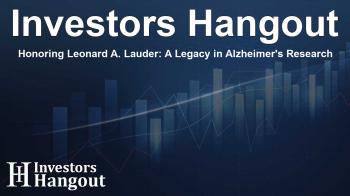Honoring Leonard A. Lauder: A Legacy in Alzheimer's Research

Remembering Leonard A. Lauder's Legacy in Alzheimer's Research
The Alzheimer’s Drug Discovery Foundation (ADDF) expresses its deep sorrow and respect following the passing of its Co-Founder and Chairman, Leonard A. Lauder. His vision and commitment have greatly influenced the landscape of Alzheimer’s research, leaving an indelible mark on the fight against this debilitating disease.
Pioneering Philanthropy in Alzheimer's Research
Leonard A. Lauder was not only a radiant force in the cosmetics industry, but also a passionate philanthropist. He co-founded the ADDF in 1998 alongside his brother Ronald and Dr. Howard Fillit, driven by the battle their mother, Estee Lauder, faced with Alzheimer’s. During a time when funding for Alzheimer’s research was alarmingly limited, the Lauder family saw a pressing need for more investment into potential treatments.
A Visionary Approach to Fundraising
With their innovative venture philanthropy model, the Lauders established the ADDF to effectively bridge scientific rigor with entrepreneurial spirit. This strategy has proven indispensable in advancing Alzheimer’s research funding, accumulating over $370 million for more than 765 drug discovery programs across 21 countries.
Transformative Contributions to Alzheimer's Research
The Lauder family’s leadership has been pivotal in catalyzing over $3 billion in additional financing from pharmaceutical companies and venture capitalists, which has significantly reduced the risk involved in early-stage scientific research. This financial support aims to attract broader investment into the sector, ultimately accelerating the development of therapeutic solutions.
Milestones in Alzheimer's Treatment Innovation
Under the guidance of Leonard Lauder, the ADDF has been instrumental in the advancement of critical diagnostic tools and treatments. The organization played key roles in the early funding of groundbreaking developments like Amyvid, the first FDA-approved PET scan for Alzheimer’s, and PrecivityAD, the first blood test to market for diagnosing the disease.
Innovating Alzheimer's Diagnostics
Leonard Lauder's vision contributed to the establishment of the Diagnostics Accelerator, a collaborative effort with prominent philanthropists aimed at making diagnostic tools affordable and accessible. This initiative represents a fundamental step toward earlier detection and intervention, which is crucial in managing Alzheimer’s effectively.
Charting the Future of Alzheimer's Therapies
Through the ADDF, the Lauder family has not only propelled scientific funding but also championed a diverse pipeline of treatment approaches targeting various biological pathways associated with aging and Alzheimer’s. With innovative strategies in precision medicine, the ADDF has paved the way for treatments that could potentially transform patient care.
Leonard Lauder’s Enduring Impact
Mark Roithmayr, CEO of the ADDF, reflected on Leonard’s influence, stating, "His leadership, generosity, and humanity made an immeasurable impact on our work and the field of Alzheimer’s research. He emphasized the urgency of finding effective treatments for patients and their families." Lauder’s commitment entailed fostering a world where effective treatments are not just envisioned but actively pursued.
Leonard Lauder's contributions resonated deeply within the organization and the broader community. His qualities of compassion and clarity of purpose stand as a testament to his dedication, impacting all who worked alongside him.
ADDF’s Continued Commitment
The Alzheimer’s Drug Discovery Foundation honors Leonard A. Lauder’s legacy by remaining steadfast in its mission to conquer Alzheimer’s disease. The ADDF is committed to accelerating drug discovery efforts and supporting families affected by this complex and life-altering condition.
Frequently Asked Questions
1. Who was Leonard A. Lauder?
Leonard A. Lauder was the co-founder and chairman of the Alzheimer’s Drug Discovery Foundation, noted for his contributions to philanthropy and Alzheimer’s research.
2. What is the ADDF’s mission?
The Alzheimer’s Drug Discovery Foundation aims to rapidly accelerate drug discovery efforts to prevent, treat, and cure Alzheimer’s disease.
3. How did Leonard Lauder impact Alzheimer’s research?
Leonard Lauder significantly enhanced funding for Alzheimer’s research, catalyzed new partnerships, and supported groundbreaking diagnostic and therapeutic advances.
4. What funding model does the ADDF use?
The ADDF employs a venture philanthropy model to strategically fund research initiatives in academia and the biotech industry.
5. How can one support ADDF's initiatives?
Support for the ADDF can be extended through donations that contribute to ongoing Alzheimer’s research and development efforts.
About The Author
Contact Thomas Cooper privately here. Or send an email with ATTN: Thomas Cooper as the subject to contact@investorshangout.com.
About Investors Hangout
Investors Hangout is a leading online stock forum for financial discussion and learning, offering a wide range of free tools and resources. It draws in traders of all levels, who exchange market knowledge, investigate trading tactics, and keep an eye on industry developments in real time. Featuring financial articles, stock message boards, quotes, charts, company profiles, and live news updates. Through cooperative learning and a wealth of informational resources, it helps users from novices creating their first portfolios to experts honing their techniques. Join Investors Hangout today: https://investorshangout.com/
The content of this article is based on factual, publicly available information and does not represent legal, financial, or investment advice. Investors Hangout does not offer financial advice, and the author is not a licensed financial advisor. Consult a qualified advisor before making any financial or investment decisions based on this article. This article should not be considered advice to purchase, sell, or hold any securities or other investments. If any of the material provided here is inaccurate, please contact us for corrections.

